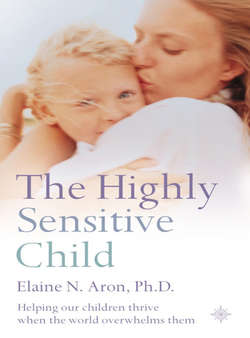Читать книгу The Highly Sensitive Child: Helping our children thrive when the world overwhelms them - Elaine N. Aron, Elaine N. Aron Ph.D. - Страница 46
5. Caution Before Proceeding in New, Possibly Dangerous Situations
ОглавлениеBecause sensitive children see so much in every situation, they will have some new aspects to notice even in a familiar one. Imagine two children coming into the kitchen in the morning. To the non-HSC, it’s just like every other morning. The HSC, however, notices father’s coat is gone so he has left early; mother is in a strange mood; there’s a paper bag behind the door as if someone tried to hide it fast; a smell of burnt toast; a broken dish in the trash. Did they have another fight? Or maybe they’re distracted, getting ready for my birthday tomorrow?
Given this sensitivity to even familiar situations, an entirely new situation has to be well processed before an HSC enters it. That is just how it is. This can be frustrating for nonsensitive parents especially, for whom a surprise party is just a party, or the ocean is just the ocean—something kids are supposed to love and dive right into. But their HSC wants to check it out, and if forced to proceed, may protest, not enjoy it, or refuse this “pleasure” altogether.
Yet this is a quality of HSCs that parents can easily appreciate, too. HSCs are not as likely to fall from trees, get lost, be hit by a car, try smoking, or be abducted or misused by a disturbed adult. You warned them of the dangers and they check every unfamiliar situation to see if those dangers are present. It is even better with teenagers. They are better drivers (or will not drive—my son did not wish to take on that huge responsibility until he was twenty-seven). They are cautious about drugs, sex, breaking the law, and who they hang around with.
But you also do not want your child to miss out on interesting new experiences, as when Maria, the HSC described at the beginning of this chapter, was invited as a teenager to travel to Sweden. She insisted that she would not go, but her mother insisted that she would; later, a happy call from Stockholm proved her mother correct.
There are times, of course, when HSCs are not so cautious in new situations. In Chapter 1 you learned about the pause-to-check and go-for-it systems in every brain. All HSCs are strong in the first, but the two systems are independent, so some HSCs are high on both. They are careful, but also adventuresome. In that chapter I described Ann, who rides motorcycles and jumps out of airplanes, but only her parents know how much she has studied the safety considerations and how much down time she needs to recover. You also met Chuck, who climbs trees like a monkey and loves to ski. But only his mother knows he has never broken a bone because he has checked out every unfamiliar branch and slope. Since the culture admires and encourages adventuresomeness, often only the parents know their child’s secret, cautious side.
We will talk more about the problems associated with pausing before proceeding and how to deal with them in Chapter 8 and Chapter 9. But for now, here are some overall recommendations.
Remember the advantages of your child’s caution—this will help you not be disappointed when it seems “uncool.”
See it from your child’s viewpoint. You have been in this situation many times, but he has not. You no longer notice the cliff beside the road or the shadows on the path. And there may be fewer risks for you. These are not your future playmates; you are bigger so dogs and waves and cars look smaller; you are used to heavy jet planes staying in the air.
Point out what is familiar or what resembles past situations that your child has mastered. “The family reunion will be a lot like Grandma Mae’s birthday party.” “The ocean is just a huge bathtub and the waves are like the kind you make when you move around in your bath.” “There’s Sue—you met her last week at Nancy’s party.”
Take it one step at a time. See Chapter 7 for these steps. Keep each step small and easy so your child can hardly protest and will definitely succeed and look good. “You don’t have to talk to anybody if you don’t want to. Just come and watch. You can be busy with your Gameboy.” After some watching, you can try saying, “I’ll bet if you walk Tiger over to those swings, someone will ask you what kind of dog he is.”
Provide a retreat (if you can do so without drawing embarrassing attention to your child). “You can go to your room whenever you want to leave the party. Just slip out and I’ll cover for you if anyone asks.” “I’ve told the teacher you may want to go and rest—just tell her.”
Success is the key to your child exploring new situations in the future. Remember, all HSCs have a go-for-it system. They want to explore, as long as the risks do not seem too high. So point out all that they will gain from exploring (without going overboard) while minimizing the risks. “I was so impressed, seeing you out there in the deep end swimming like a fish. To think you couldn’t swim at all last summer. Next week you’ll be starting middle school and changing classes every period. Think of it—if one teacher’s a drag or you don’t like some kid in your class, you aren’t stuck all day. And you get to take those two electives you signed up for. You already know enough about computers and Native Americans to practically teach those classes yourself. I’ll bet it won’t be long before you’re ‘in the swim’ there, too.”
